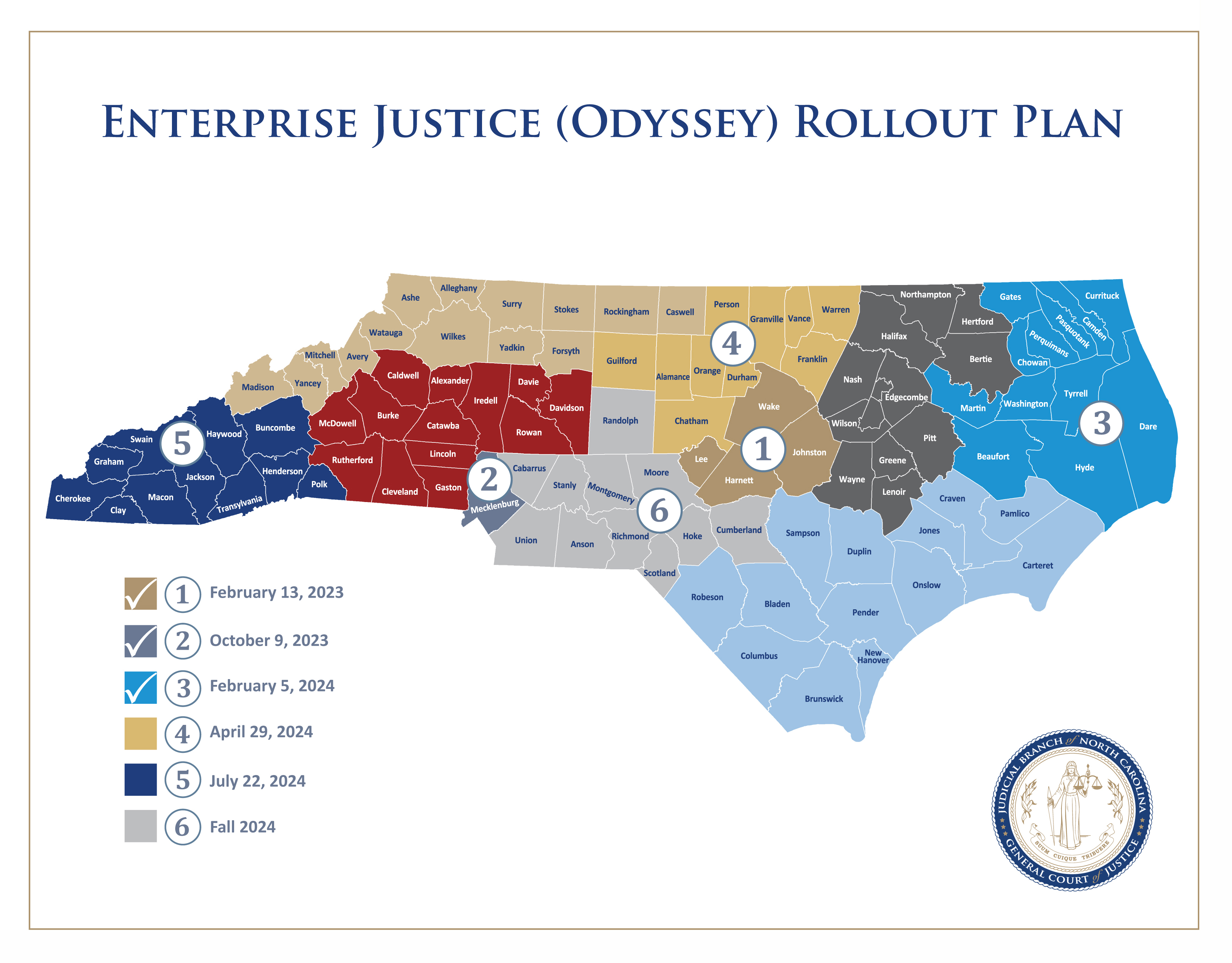eCourts Expands to Nearly Half of State’s Population
Article contents

UPDATE: eCourts is Now Live in 10 Additional Counties
Nearly half of North Carolina’s population will live in jurisdictions served by eCourts software when Track 4 of the digital records rollout goes live on April 29, 2024, according to an announcement from the Administrative Office of the Courts (NCAOC) today.
eCourts empowers the public by replacing paper processes with cloud-hosted online access to deliver electronic filing and a free online search Portal to display court records and case events.
“I believe we have moved from an archaic system to a state-of-the-art system that is bringing North Carolina into the forefront of what is available to courts online in our country,” Johnston County Clerk of Superior Court Michelle Ball told the Joint Legislative Oversight Committee on Justice and Public Safety in a hearing this month on eCourts.
“I am a big fan of Odyssey...Odyssey works...in my opinion we have been able to persevere and move the court system forward. As Odyssey proceeds, it gets better every time it is rolled out...It is helping our clerks’ offices to serve our citizens and your constituents better.”
Track 4 of North Carolina’s eCourts transition is the largest track of the rollout schedule based on its volume of legal filings, and contains Alamance, Chatham, Durham, Franklin, Granville, Guilford, Orange, Person, Vance, and Warren counties.

Iredell County Clerk of Superior Court Jim Mixson, who serves as the President of the Conference of Clerks of Superior Court, also spoke to the Joint Legislative Oversight Committee on Justice and Public Safety:
“We support Chief Justice Newby’s vision, we support Director Boyce’s commitment, and we will continue to partner with the Administrative Office of the Courts and our stakeholders, to bring eCourts to fruition,” Clerk Mixson told legislators.
As of this month, the state’s three largest metropolitan regions (Greensboro, Raleigh, and Charlotte) will be live with electronic filing and online search for court records, and eCourts will provide electronic access to justice for more than 4.5 million North Carolinians across 27 counties.
“Delivering digital access to justice to nearly half of North Carolina’s population in dozens of our largest, smallest, and fastest-growing jurisdictions, is a major milestone for the eCourts transition,” said NCAOC Director Ryan S. Boyce. "We are proud of this progress and the steadfast commitment of court officials who support this transition to serve millions more citizens with the convenience of electronic legal filing and online search instead of paper processes.”
The suite of eCourts case management applications Enterprise Justice (formerly Odyssey) has accepted over 1 million electronic filings in North Carolina. Tens of thousands of electronic searches for digital court records are conducted daily through the eCourts Portal in North Carolina, saving citizens countless trips and calls to the courthouse for simple case information and documents.
North Carolina is behind economic competitors in the digital transition to eCourts software: Texas recently reached a 10-year anniversary of mandatory eFiling in all 254 of its counties with the same eCourts software and vendor used by North Carolina.
The NCAOC estimates that more than 3 million sheets of paper have been saved during the first three tracks of eCourts since February 2023. Historically, roughly 30 million pieces of paper were added to court files each year in North Carolina. The transition from paper court records to digital files is also shifting data storage from decades-old mainframe technology to cloud hosting and storage, allowing the state to retire outdated onsite application hosting and storage infrastructure while improving cybersecurity.
As eCourts expands statewide, millions more North Carolinians gain mobile access to their courthouse, saving time and providing transparency. In addition to electronic filing and records searches, the eCourts suite of applications also includes the already statewide eWarrants and Enforcement Mobile platforms, which integrate law enforcement processes with the court system, and Guide & File, a tool that helps self-represented users create and electronically file common legal actions through automated interviews. Statewide, more than 36,000 registered eWarrants users have issued 1.2 million criminal processes since the eCourts application for law enforcement replaced older systems in July 2022.
A large network of IT and software systems teams from NCAOC supports the eCourts transition through training, on-site assistance, remote monitoring, and help desk response. Several eCourts platforms already operate statewide, including eWarrants, Enforcement Mobile and a dual-form of Guide & File. Unlike many states where court technology is managed locally, North Carolina’s unified Judicial Branch is taking a comprehensive approach to its digital transformation for every case type in all 100 counties, while integrating with other state and local agencies, including law enforcement.
Preparations and walkthroughs for each track of the eCourts transition begin months in advance to train court officials and the public on new technologies and processes, install improved network infrastructure in courthouses, program custom integrations, and migrate case event data and court records from mainframe indexes and paper to a dynamic cloud-hosted platform.
Register for eCourts trainings and access education materials, screenshot reference guides, FAQs, and other resources supporting the transition, at NCcourts.gov/eCourts.